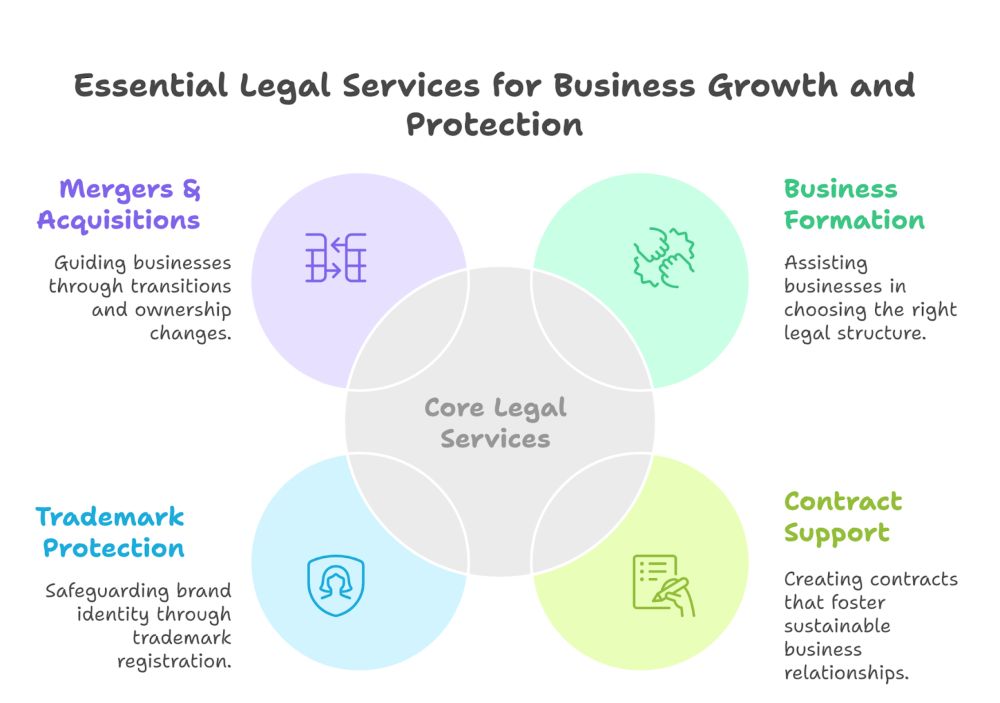The Legal Foundation of Local Business Success: How Smart Legal Strategy Supports Shop Local Movements
Local businesses form the backbone of thriving communities, creating jobs and keeping money circulating within the neighborhood economy.
Yet many small business owners focus solely on daily operations while overlooking the legal foundation that can protect and accelerate their growth.
A smart legal strategy isn’t just a defensive measure—it’s a competitive advantage that allows local businesses to operate confidently while aligning with community values and shop local movements.
Building a proper legal foundation helps small businesses avoid costly mistakes and positions them for sustainable success.
From choosing the right business structure to protecting intellectual property, legal guidance from the outset helps entrepreneurs mitigate risks and focus on growth rather than worry about potential legal issues.
When local businesses have solid legal protection, they can innovate more freely and better serve their communities.
The relationship between strong local businesses and effective legal support creates a positive cycle that strengthens the entire community.
A fractional legal approach allows smaller companies to access sophisticated legal support that was once available only to larger corporations.
Key Takeaways
- Small businesses with strong legal foundations can focus on growth and innovation instead of worrying about potential legal problems.
- Smart legal strategies provide local businesses with competitive advantages that help them thrive within shop local movements.
- Scalable legal solutions give small businesses access to sophisticated legal protection that grows with their needs and strengthens the entire community.
The Economic Impact Of Local Businesses In Iowa And Austin

The vitality of local economies in Iowa and Austin hinges significantly on the success of independent businesses.
Research shows that local businesses create more jobs and circulate more money within their communities than chain retailers.
For every $100 spent at a local business, $68 stays in the community, versus only $43 when spent at a chain.
Why Local Businesses Matter To The Economy
In Iowa, local businesses form the backbone of both rural and urban economies. Small enterprises represent over 99% of all businesses in the state and employ nearly half of all Iowa workers.
These businesses create a unique local identity that attracts tourism and additional investment.
Austin’s economy benefits similarly from its robust “Keep Austin Weird” culture that promotes independent business growth. The city’s vibrant local business scene has helped it weather economic downturns better than many comparable cities.
Local businesses contribute significantly to the tax base in both regions. They generate property taxes, sales taxes, and income taxes that fund essential community services like schools, parks, and infrastructure.
Unlike chain stores, local businesses often occupy historic buildings and contribute to neighbourhood character. This creates the conditions that foster community success and strengthen civic engagement.
The Local Multiplier Effect
The “local multiplier effect” describes how money circulates within a community when spent at independent businesses.
Studies show that for every $100 spent at a local business, approximately $68 remains in the local economy, compared to just $43 from chain stores.
In Iowa’s agricultural communities, this effect is particularly powerful. When farmers sell directly to local restaurants and markets, they receive more of the food dollar while creating jobs in processing, distribution, and retail.
Austin’s technology startups and creative businesses demonstrate this effect through their hiring practices.
They tend to:
- Source services from other local businesses
- Hire local talent at competitive wages
- Reinvest profits locally through expansion
- Support community initiatives and nonprofits
This multiplier effect creates a positive feedback loop. Strong local businesses attract more entrepreneurs, diversify the economy, and make communities more resilient against economic shocks.
The Legal Needs Of Local Entrepreneurs—And Why They’re Often Overlooked
Local entrepreneurs face unique legal challenges that frequently go unaddressed until problems arise.
Many small business owners underestimate the importance of proper legal foundations while focusing on more immediate operational concerns.
Common Legal Gaps In Small Businesses
Most local entrepreneurs start their journey without comprehensive legal protection. Surprisingly, 60% of small businesses operate without proper contracts or terms of service.
Legal advice is critically important for these businesses, yet many find it difficult to access.
Key legal documents often missing from small businesses include:
- Operating agreements that define ownership and management
- Employee handbooks and proper HR documentation
- Intellectual property protection for logos, products, and methods
- Privacy policies for websites and customer data
An Iowa business lawyer for entrepreneurs can help identify these gaps before they become costly issues.
Local businesses in growing markets like Austin, TX, benefit greatly from specialized small business law firms that understand regional regulations.
The Risk Of DIY Legal Setup
The rise of online legal templates has created a false sense of security for many entrepreneurs.
While these resources appear cost-effective initially, they often create expensive problems later. 20% of small businesses fail in year one, often due to preventable legal issues.
DIY legal approaches typically fail to address:
- State-specific requirements that vary greatly across jurisdictions
- Industry-specific regulations that may apply to the business
- Tax implications of business structure choices
- Liability exposure is unique to the local business environment
Smart legal strategies protect basic formation documents. When local entrepreneurs work with qualified legal professionals, they create strong foundations that support growth while avoiding common pitfalls.
Many business owners don’t realize that preventative legal work costs a fraction of what litigation expenses might total.
Proactive strategies to avoid litigation protect both business assets and community reputation.
Starting a business in Iowa or Austin? Surge Business Law’s business formation services make it simple to launch with legal confidence—set up your LLC the right way, right from the beginning. Schedule now.
Core Legal Services That Fuel Local Business Growth

Local businesses require a solid legal foundation to thrive in today’s competitive marketplace.
Smart legal strategies protect assets, create sustainable growth opportunities, and help navigate the complex regulatory landscape that affects small enterprises.
Business Formation And Entity Selection
Choosing the right business structure is one of the first and most crucial decisions small business owners face.
A qualified small business formation attorney can guide entrepreneurs through options like:
- Sole Proprietorship: Simple, but offers no liability protection
- LLC (Limited Liability Company): Provides liability protection while maintaining tax flexibility
- S-Corporation: Offers potential tax advantages for profitable businesses
- B-Corporation: For socially conscious companies with specific public benefit goals
The right entity can shield personal assets from business liabilities and optimize tax situations.
In Austin’s growing entrepreneurial scene, legal professionals who understand local regulations prove invaluable during the formation process.
Entity selection should consider factors beyond immediate needs, including future growth plans, investor potential, and exit strategies.
Local attorneys familiar with regional business ecosystems often provide context-specific advice that generic online resources cannot match.
Contracts That Support Sustainable Relationships
Well-crafted contracts form the backbone of healthy business relationships. For local businesses, these legal documents must balance protection with practicality to support sustainable growth.
Key contract types include:
| Contract Type | Purpose | Key Elements |
| Vendor Agreements | Secure supply chains | Delivery terms, quality standards, and payment schedules |
| Customer Contracts | Set clear expectations | Scope of services, warranties, and dispute resolution |
| Lease Agreements | Establish physical presence | Term length, rent adjustments, and maintenance responsibilities |
| Employment Contracts | Protect workforce relationships | Compensation, duties, and confidentiality provisions |
Legal support for business contracts helps prevent costly misunderstandings and builds trust with partners.
Strong contracts should anticipate potential problems while remaining flexible enough to adapt to changing business conditions.
Local attorneys often craft agreements that reflect community standards and expectations, strengthening a business’s reputation as a reliable partner. Regular contract reviews ensure legal protections evolve with the business.
Trademarks And Brand Protection
For local businesses, brand identity represents a crucial competitive advantage.
Trademark protection for local brands secures these valuable assets against competitors who might otherwise capitalize on established goodwill.
The trademark protection process typically involves:
- Comprehensive search to identify existing similar marks
- Application preparation with precise goods/services descriptions
- Registration monitoring to track application progress
- Enforcement strategies to address potential infringements
Even businesses operating primarily within one community benefit from federal trademark registration. This protection prevents competitors from expanding into the area with confusingly similar branding.
Brand protection extends beyond trademarks to include trade dress, domain names, and social media handles.
A cohesive strategy ensures all elements of a brand identity receive appropriate legal protection. Regular audits help identify new assets that may require protection as the business evolves.
Mergers, Acquisitions, And Business Transitions
Business transitions represent critical moments where solid legal guidance proves essential.
Whether you want to buy a business or sell your own small business legally, proper legal structures protect all parties involved.
Key considerations during transitions include:
- Due diligence: Thorough investigation of assets, liabilities, and obligations
- Valuation methods: Determining fair market value through appropriate techniques
- Transaction structure: Asset sale vs. stock sale implications
- Succession planning: Ensuring smooth operational continuity
For local businesses, transitions often involve community considerations, such as preserving jobs and maintaining neighborhood character.
Legal strategies can incorporate these values while still protecting the financial interests of buyers and sellers.
Transition plans should address potential obstacles early, including regulatory approvals, financing contingencies, and employee retention concerns.
Experienced attorneys anticipate challenges specific to local markets and create solutions that honor community relationships while achieving business objectives.
Surge’s Momentum Membership: A Scalable Legal Strategy For Local Success

Small businesses require affordable legal assistance to thrive in their local economies.
The Momentum Membership from Surge Business Law provides a subscription-based solution that makes quality legal advice accessible to community businesses without breaking the bank.
What It Offers
The Momentum Membership delivers expert legal and business advice for just $95 per month.
This subscription-based service includes:
- Unlimited support for ongoing legal questions
- Compliance assistance to navigate regulations
- Cost savings on essential legal services
- No long-term commitment with the ability to cancel anytime
Local business owners gain access to professional legal guidance without the financial burden of traditional attorney fees.
This helps entrepreneurs focus on growing their business rather than worrying about legal details.
The membership serves as a preventative measure against potential legal issues. It provides peace of mind knowing that legal expertise is just a call or email away.
Why It Works For Local Businesses
The Momentum Membership model is particularly effective for local businesses because it aligns with their financial reality.
Small companies often can’t afford dedicated legal departments or high-priced law firms.
This subscription approach creates predictable legal expenses that can be easily budgeted.
For a modest monthly fee, businesses receive guidance that could potentially save them thousands in legal problems.
Local businesses face unique challenges, including:
- Navigating municipal regulations
- Managing community relationships
- Adapting to local market conditions
The membership provides targeted advice for these specific scenarios. It helps businesses stay compliant with changing laws and regulations that might otherwise disrupt operations.
Business owners report increased confidence in decision-making when they have reliable legal backup.
This confidence translates to stronger community engagement and more sustainable local enterprises.
If you’re planning to buy or sell a business, Surge Business Law provides legally sound guidance with transparent pricing so your transition runs smoothly. Contact us to get started.
Supporting ‘Shop Local’ Means Supporting Local Legal Infrastructure
When consumers and businesses support local shops, they’re also investing in the legal ecosystem that helps these businesses thrive.
Local legal professionals, through their specialized knowledge and dedicated service, play a crucial role in creating business resilience and community stability.
Why Local Legal Professionals Matter
Local attorneys and legal advisors are familiar with the specific regulations that affect businesses in their communities.
They possess intimate knowledge of local ordinances, zoning laws, and permit requirements that national firms might overlook.
These professionals often specialize in the needs of small businesses, providing affordable and tailored legal guidance that addresses local market conditions.
When disputes arise, they can suggest resolution methods that preserve community relationships rather than damage them.
Local legal experts also contribute to the same economic ecosystem they serve.
They hire local staff, pay local taxes, and often volunteer legal services to community organizations.
By hiring local legal help, business owners ensure their legal dollars remain within the community, creating a positive cycle of local economic support.
Building Trust And Longevity In Local Markets
Businesses with solid local legal foundations establish stronger community trust.
Consumers feel confident patronizing establishments that demonstrate a commitment to legal compliance and ethical business practices.
Key trust-building legal elements include:
- Transparent customer policies
- Fair employment practices
- Proper licensing and permits
- Clear ownership structures
Local legal professionals assist businesses in navigating growth stages while upholding community values.
They understand how to balance expansion with maintaining the authentic local character that customers value.
Many small business disputes can be prevented through proactive legal planning.
Local attorneys can develop dispute resolution frameworks that prioritize mediation and maintain vital business relationships.
This approach creates sustainable business models that can weather economic challenges while maintaining community connections for generations.
How To Build Your Legal Foundation With Surge Business Law
Surge Business Law combines practical business expertise with legal knowledge to help small businesses establish strong foundations.
Their approach focuses on making legal services accessible and relevant to local entrepreneurs at every stage of growth.
Free Resources For First-Time Entrepreneurs
Starting a business involves navigating complex legal requirements that many entrepreneurs don’t initially understand.
Surge Business Law offers valuable resources for business owners that help new entrepreneurs identify and manage potential legal risks.
Their business legal checklist for startups covers essential steps like:
- Entity formation documentation
- Trademark protection strategies
- Contract templates for common business needs
- Employment law compliance guides
These free tools help first-time business owners avoid costly mistakes.
Rather than overwhelming entrepreneurs with legal jargon, Surge presents information in clear, actionable formats.
Local Iowa businesses, in particular, benefit from resources tailored to state-specific requirements.
As flat fee business attorneys in Iowa, they eliminate the uncertainty of hourly billing that often prevents small businesses from seeking legal help.
Affordable Support To Grow With You
Surge Business Law structures its services to scale with businesses as they develop.
They understand that small businesses need legal support but often can’t afford traditional law firm rates.
Their approach includes:
- Predictable flat-fee packages
- Fractional legal services (part-time legal counsel)
- Pay-as-you-go options for specific legal needs
This flexibility lets local businesses access professional legal advice without overextending their budgets.
Many entrepreneurs find this model helps them build a strong legal foundation while preserving capital for growth initiatives.
The team collaborates with clients to identify and address unique business challenges, developing customized legal strategies tailored to their specific needs.
They prioritize practical solutions over complex legal frameworks, focusing on what truly protects the business while supporting its growth objectives.
Conclusion
Local businesses form the backbone of communities nationwide. With proper legal strategies, they can withstand challenges and grow sustainably within their communities.
Legal certainty provides small business owners with the confidence to invest, innovate, and expand.
By understanding regulations and proactively managing risks, local entrepreneurs can focus on what they do best—serving their communities.
Shop local movements gain momentum when businesses operate on solid legal foundations. Clear contracts, proper licensing, and intellectual property protection create an environment where local commerce can flourish.
Technology adoption has become essential for legal compliance. Modern small businesses are increasingly embracing legal technology to streamline operations and ensure compliance with all regulatory requirements.
Communities benefit when legal frameworks support rather than hinder local enterprise. Simplified compliance pathways help small businesses thrive despite complex regulatory environments.
The future of local business success depends on accessible legal resources. Small business owners need to easily navigate legal requirements to contribute effectively to local economic resilience and community identity.
Need help protecting your growing brand? Surge Business Law offers flat-rate trademark services designed to secure your business identity and keep competitors at bay—schedule a consultation today.
Frequently Asked Questions
Why is legal strategy important for small businesses?
A well-defined legal strategy helps small businesses prevent disputes, protect their assets, and comply with regulations. It builds a strong foundation that supports sustainable growth and reduces costly risks.
How do local businesses benefit from legal support?
Legal support ensures that local businesses are properly structured, protected from liability, and equipped with solid contracts. This allows them to operate confidently and invest more in their communities.
What legal services do small businesses typically need?
Common legal services include business formation, trademark registration, contract drafting, employment agreements, and dispute resolution. These services help businesses stay compliant and avoid legal pitfalls.
How does trademark protection help local brands?
Trademark protection safeguards a business’s name, logo, or slogan from being used by others. It strengthens brand recognition and prevents costly legal battles over intellectual property.
What’s the best legal structure for a small business?
For many small businesses, an LLC (Limited Liability Company) provides the ideal balance of liability protection and tax flexibility. However, the ideal structure depends on your goals and location.
What is flat-fee legal support for small businesses?
Flat-fee legal support offers predictable pricing for services such as contracts or trademarks. Firms like Surge Business Law offer these models to make legal help more accessible and affordable.
How does supporting local businesses boost the economy?
When consumers buy local, more money stays in the community. Local businesses create jobs, invest in neighborhoods, and strengthen regional economies—especially when backed by strong legal infrastructure.


